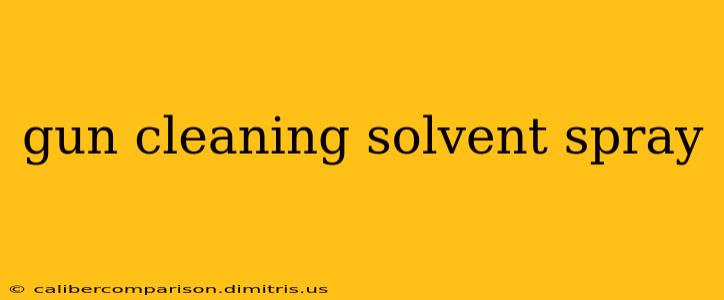Maintaining your firearm's cleanliness is paramount for its longevity, reliable operation, and, most importantly, your safety. A crucial element in this process is the use of a high-quality gun cleaning solvent spray. This guide dives deep into the world of gun cleaning solvents, exploring their types, applications, and safety precautions to ensure you're equipped with the knowledge to properly care for your firearms.
Understanding Gun Cleaning Solvent Sprays
Gun cleaning solvent sprays are specifically formulated to dissolve gunpowder residue, lead, copper fouling, and other contaminants that accumulate within the firearm's barrel, action, and other components. These solvents are designed to break down these deposits, making them easier to remove with patches and brushes during the cleaning process. Choosing the right solvent is critical, as different formulations cater to different needs and firearm types.
Types of Gun Cleaning Solvent Sprays
Several types of gun cleaning solvents exist, each with its own strengths and weaknesses:
-
General Purpose Solvents: These are all-purpose cleaners suitable for most firearms and calibers. They effectively remove common residues but might not be as potent against stubborn deposits. Many gun owners find these to be a great starting point.
-
CLP (Cleaner, Lubricant, Preservative): CLP products combine cleaning, lubricating, and rust-preventing properties in a single solution, streamlining the cleaning process. They are particularly popular among shooters who value convenience and efficiency.
-
Bore Solvents: Designed specifically for cleaning the gun barrel, bore solvents often contain stronger chemicals to tackle tough fouling, especially lead and copper deposits. These are typically more aggressive than general-purpose solvents and should be used accordingly.
-
Specialized Solvents: Specific solvents are available for removing certain types of fouling, like those resulting from black powder or certain types of ammunition. These should be used only when necessary and according to the manufacturer's instructions.
Selecting the Right Gun Cleaning Solvent Spray
Choosing the right solvent depends on several factors:
-
Type of Firearm: Different firearms may require different cleaning methods and solvents. Handguns often require less intense cleaning than rifles, particularly those used for high-volume shooting.
-
Type of Ammunition: Ammunition type directly influences the type of residue left behind. Black powder leaves significantly different residue than modern smokeless powder.
-
Frequency of Use: If you shoot frequently, you might need a more powerful solvent to handle the accumulated fouling. Less frequent shooting might only require a general-purpose cleaner.
-
Personal Preference: Ultimately, the "best" solvent is the one that works effectively for you and your firearms while maintaining safety practices.
Safe Handling and Usage of Gun Cleaning Solvent Sprays
Safety should always be the top priority when handling gun cleaning solvents:
-
Ventilation: Always clean your firearms in a well-ventilated area to avoid inhaling harmful fumes. A garage or outdoors is often ideal.
-
Eye Protection: Wear safety glasses to protect your eyes from splashes or fumes.
-
Gloves: Wear gloves to protect your skin from the solvent.
-
Proper Disposal: Dispose of used solvent and cleaning patches responsibly, following local environmental regulations. Never pour solvents down the drain.
-
Read Instructions: Always read and follow the manufacturer's instructions carefully before using any gun cleaning solvent.
Maintaining Your Firearms: Beyond the Solvent
While a good gun cleaning solvent is essential, it's only one part of proper firearm maintenance. Regular cleaning, proper lubrication, and storage in a dry environment are all vital for ensuring your firearm's longevity and reliable operation.
Conclusion
Selecting and using the right gun cleaning solvent spray is crucial for maintaining your firearms. By understanding the different types of solvents, their applications, and essential safety precautions, you can ensure your firearms remain clean, functional, and safe to operate. Remember to always prioritize safety and follow manufacturer instructions for optimal results.

